Photographs: Reuters E T B Sivapriyan in New Delhi
Set to retire on December 31, Delhi Metro chief Elattuvalapil Sreedharan sums up his 16-year experience as a 'very satisfying' and attributes the organisation's success to the 'different work culture' and fast decision-making process.
The 79-year-old Sreedharan, who has worked in government service for over 58 years in different organisations and capacities, says he wants to spend his post-retirement days in his village in Thrissur district of Kerala.
In an interview with PTI, the technocrat spoke about his experiences in Delhi Metro, the hurdles he faced during the initial days and how the organisation was different from other government companies.
. . .
Metro Man Sreedharan to retire, says stint was 'very satisfying'
Photographs: Reuters
Sreedharan, who joined the Delhi Metro Rail Corporation (DMRC) in 1995, said there were no problems with regard to funds and clearances from government departments, but the main challenge during the construction of Metro was about the 'complex technology' that was new to the country.
"It was a very satisfying experience, quite satisfying experience. It is a new field as far as the country is concerned. It was new experience as we were planning for a world-class metro," he said.
Delhi Metro, which started operations in 2002 on an 8-km stretch, now has 190 km network across the National Capital Region and is the fastest growing metro network anywhere in the world, he said.
. . .
Metro Man Sreedharan to retire, says stint was 'very satisfying'
Photographs: Reuters
When asked how Delhi Metro was different from other government organisations, he said it was because of the different work culture that exists.
"The environment that we created for people to work and the type of work culture that we have created here is the reason. That is entirely different from a normal government organisation. We take very fast decisions and everything is done in a very transparent way," he said.
Sreedharan said the Delhi Metro is one of the few government organisations which do not have a union because "we take care of our employees and their problems are sorted out immediately".
. . .
Metro Man Sreedharan to retire, says stint was 'very satisfying'
Photographs: Reuters
On his post-retirement plans, the 'Metro Man' said he wants to go back to his village and spend his days there with his family.
"I want to go back to my village and spend my days after 58 years of service. I joined my professional career in 1953," he said.
About the challenges he faced during his tenure, he said building the network in a 'very difficult environment' like the national capital was the main challenge because even a small mistake would come to the notice of the chief minister and others, especially the media'.
. . .
Metro Man Sreedharan to retire, says stint was 'very satisfying'
Photographs: Reuters
On whether he had any problems in getting funds, he said: "Funds were not a problem because most of the funds were coming from Japan through Japan International Cooperation Agency (JICA). Japan was committing for the loan right from the beginning. Funds were not a problem at all."
He said the loans offered by JICA are best suited for metro projects in a country like India as they are offered with a pay-back period of 30 years.
"Japanese loan is much cheaper for the country as a whole and for metro construction that is the type of loan we want," he said.
. . .
Metro Man Sreedharan to retire, says stint was 'very satisfying'
Photographs: Reuters
Asked whether Delhi Metro is profitable now after nine years of its existence, he said: "Profitable, in the sense, it does not make book profits. But operational profit, yes."
"We are able to meet entirely our operating expenditure, maintenance expenditure and servicing the loan we have taken and repayment of the loan instalment, and we are also funding our future expansions. That way it is profitable and is quite viable I would say," Sreedharan said.
Sreedharan also said that metro can never be profitable that way because it is a social service.
. . .
Metro Man Sreedharan to retire, says stint was 'very satisfying'
Photographs: Reuters
"It is a service you are rendering to the society at a very cheap rate. Our ticket rates are such that ordinary persons must be able to travel in the metro. It should be affordable to him," he said.
Asked whether the Delhi Metro could go for a public issue to raise funds, he said it was not a 'good idea' at the moment for the organisation which has huge loan deficit.
"I thought it would be necessary sometime back; that it would be a good idea to go public. But I think it is not good business for DMRC to go public at this stage when there are so many loans and we have got a responsibility to fulfil."
. . .
Metro Man Sreedharan to retire, says stint was 'very satisfying'
Photographs: Reuters
"Loans are all for 30 years. With such a loan liability, it will not be able to attract investments from the public. But if the government takes over the loan liability then we can. But the government will not do this," he said.
Delhi Metro currently has a debt of Rs 18,000 crore (Rs 180 billion) and another Rs 18,000 crore debt would be added once the Phase-III work begins.
"Till we stop expansion we will keep getting loans. No investor will get any returns. . . also, how will people take their share from DMRC?" he asked.

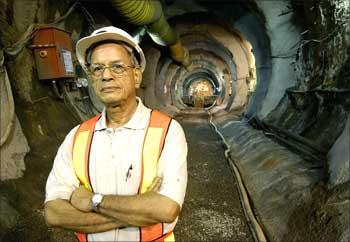
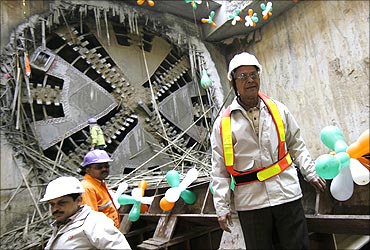
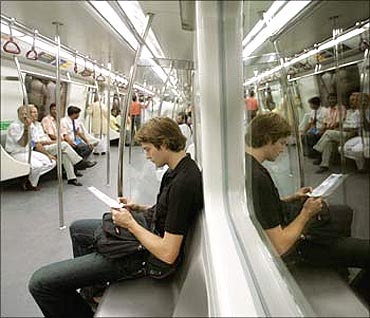
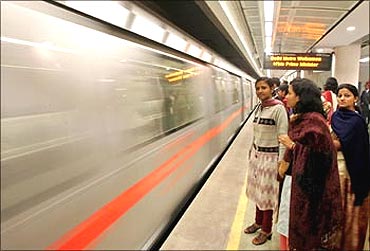
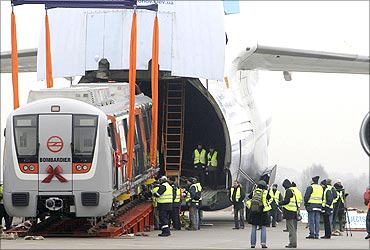
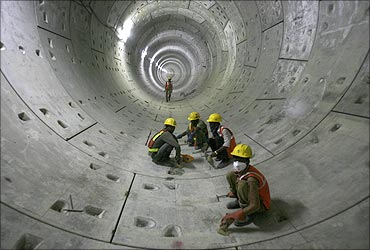
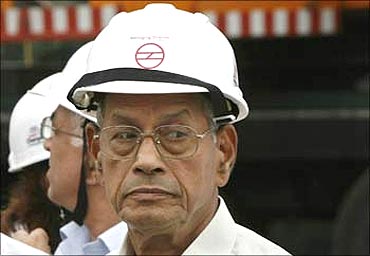
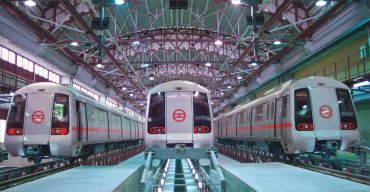
article